Discover the remarkable benefits of pure Moringa powder with “Leaf of Life.” Our 100% organic Moringa powder is a superfood powerhouse, rich in vitamins, minerals, and antioxidants to boost your nutrition and health. Ideal for enhancing energy, supporting immunity, and promoting overall well-being. Unlock the miracle of nature with our sustainably sourced, high-quality Moringa powder. Perfect for smoothies, meals, and healthy lifestyles.
Introduction
Moringa Oleifera, often hailed as the “miracle tree,” is a plant that has been celebrated for its nutritional and medicinal properties for centuries. Native to parts of Africa and Asia, it is now gaining popularity worldwide as a superfood, particularly in the form of pure Moringa powder. This article dives into the myriad benefits of Moringa powder, offering insights into how it can enrich your health and well-being.
Table of Contents
The Moringa Miracle
Nutritional Powerhouse
One of the most compelling aspects of the Moringa tree is its incredibly dense nutritional profile. It’s packed with vitamins, minerals, antioxidants, and other beneficial compounds. Here are some key nutritional highlights of Moringa:
- Vitamins and Minerals: Moringa leaves are rich in vitamins A, C, and E, calcium, potassium, and iron. Just a few grams of Moringa leaves can meet a significant portion of the daily recommended intake of these essential nutrients.
- Protein: Moringa leaves contain all nine essential amino acids, making it a rare plant-based source of complete protein. This is particularly beneficial for vegetarians and vegans looking to increase their protein intake.
- Antioxidants: The leaves are loaded with antioxidants such as quercetin, chlorogenic acid, and beta-carotene, which can help protect the body against oxidative stress and may reduce the risk of chronic diseases.
Health Benefits
The diverse array of nutrients in Moringa contributes to its many health benefits. Here are some of the ways Moringa can enhance health:
- Boosts Immune System: The high levels of vitamin C in Moringa help bolster the immune system, making the body more resistant to infections and diseases.
- Anti-inflammatory Effects: Moringa has anti-inflammatory properties thanks to its isothiocyanates, which can help reduce inflammation in the body and alleviate symptoms of conditions like arthritis.
- Supports Digestive Health: The fiber content in Moringa leaves aids in digestion and can help prevent constipation and other digestive issues.
- Promotes Heart Health: Antioxidants in Moringa can help lower blood pressure and cholesterol levels, reducing the risk of heart disease.
- Enhances Skin and Hair Health: The vitamins and minerals in Moringa can contribute to healthy skin and hair, acting as a natural beautifier from within.
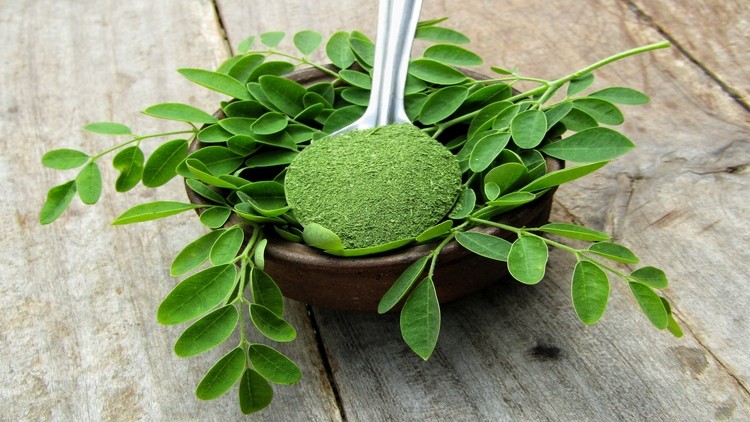
Incorporating Moringa into Your Diet
Moringa can be incorporated into the diet in various forms, such as powder, capsules, and tea. The powder can be added to smoothies, soups, and salads for an extra nutritional boost. Given its high nutrient content, even small amounts of Moringa can contribute significantly to meeting daily nutritional needs.
Incorporating Moringa into Your Diet
Forms of Moringa
Moringa can be found in several forms, making it easy to include in your daily routine:
- Powder: Moringa leaves are dried and ground into a fine powder, which can be added to smoothies, soups, and sauces.
- Leaves: Fresh or dried Moringa leaves can be used similarly to spinach or kale in salads, stews, and other dishes.
- Capsules: For those who prefer supplements, Moringa is available in capsule form.
- Tea: Moringa leaves can be steeped in hot water to make a nutritious tea.
- Seeds and Oil: Moringa seeds and the oil extracted from them are also used for their health benefits, though they are less commonly incorporated into diets.
Incorporating Moringa Powder
Moringa powder is one of the easiest ways to include Moringa in your diet due to its versatility. Here are some ideas:
- Smoothies: Add a teaspoon of Moringa powder to your morning smoothie for an extra nutrient kick.
- Juices and Teas: Mix a small amount of Moringa powder into your favorite juice or herbal tea.
- Baking: Substitute a small portion of flour with Moringa powder in your baking recipes for a nutritional boost.
- Cooking: Sprinkle Moringa powder into soups, stews, or pasta sauces. It has a mild flavor that complements many dishes.
Using Fresh or Dried Leaves
If you have access to fresh or dried Moringa leaves, here’s how you can use them:
- Salads: Fresh leaves make a nutritious addition to any salad.
- Cooked Greens: Sauté Moringa leaves as you would spinach or kale, with a bit of garlic and olive oil.
- Teas: Dried leaves can be used to brew tea. Simply steep them in hot water for a few minutes.
Creative Recipes
- Moringa Pesto: Blend fresh Moringa leaves with garlic, nuts, Parmesan cheese, and olive oil for a nutritious pesto sauce.
- Energy Bars: Mix Moringa powder into homemade energy bars with nuts, seeds, and dried fruits.
- Soup: Add Moringa leaves or powder to chicken or vegetable soup for an extra dose of nutrients.
Dosage and Considerations
While Moringa is highly nutritious, it’s important to consume it in moderation. Start with small amounts, such as a teaspoon of powder, and observe how your body reacts. Pregnant women and those on medication should consult with a healthcare provider before adding Moringa to their diet due to its potent bioactive compounds.
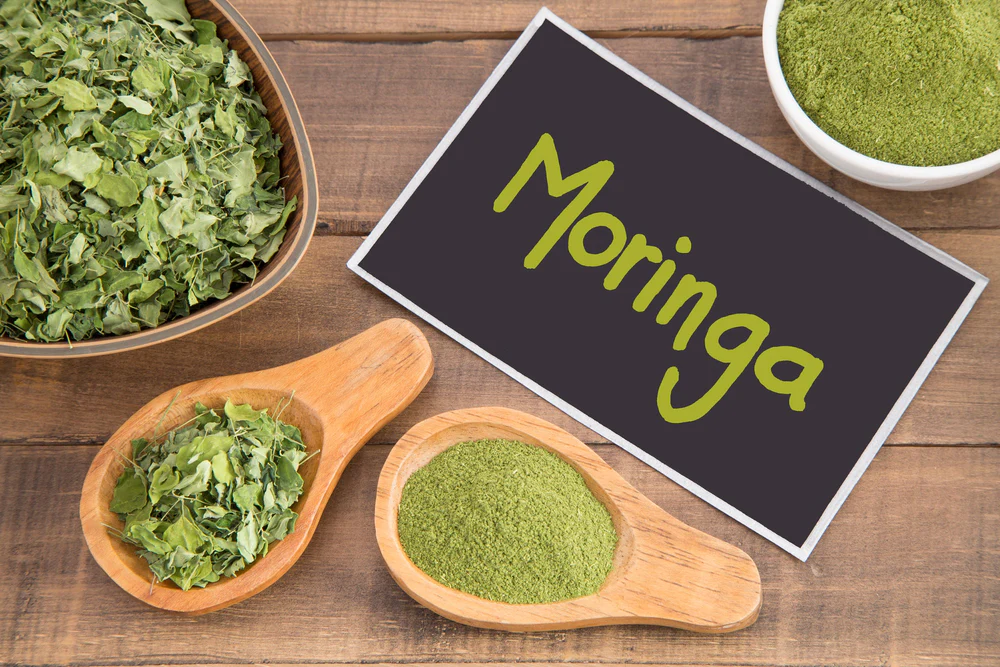
The Sustainability of Moringa Cultivation
Adaptability to Harsh Environments
One of the most compelling attributes of Moringa is its exceptional adaptability to a variety of climatic conditions, particularly its ability to grow in areas with poor soil, limited water, and extreme temperatures. This resilience makes it an ideal crop for regions prone to drought and famine, where many other plants would fail to survive.
- Drought Resistance: Moringa requires significantly less water compared to other crops, making it suitable for arid regions and ensuring food security in areas with water scarcity.
- Soil Improvement: Moringa’s deep root system can help improve soil fertility and structure, promoting better water retention and nutrient availability for other plants in agroforestry systems.
Rapid Growth and High Yield
Moringa trees grow quickly, often reaching maturity within a year of planting, which allows for multiple harvests annually. The leaves, seeds, and pods can all be utilized, offering a continuous source of food, oil, and fodder. This rapid growth and high yield make Moringa an efficient and sustainable crop, capable of providing substantial resources with minimal land use.
Environmental Benefits
Beyond its adaptability and productivity, Moringa cultivation offers several environmental benefits:
- Carbon Sequestration: Like other trees, Moringa absorbs carbon dioxide from the atmosphere, contributing to the reduction of greenhouse gases and combating climate change.
- Biodiversity: Moringa plantations can support biodiversity by providing habitats for various species of birds, insects, and other wildlife.
- Water Purification: Moringa seeds contain a protein that can bind to impurities, making them an effective and natural way to purify water. This application is especially valuable in developing countries where access to clean water is a challenge.
Socio-Economic Impact
The cultivation of Moringa can also have a positive socio-economic impact on communities:
- Income Generation: Moringa products, such as leaf powder, oil, and beauty products, have a growing market globally. Farmers can diversify their income sources by selling these products.
- Employment Opportunities: The processing of Moringa leaves and seeds into consumable and commercial products can create employment opportunities in local communities.
- Nutritional Security: Moringa’s dense nutritional profile can help combat malnutrition in impoverished regions, providing essential vitamins and minerals to populations in need.
Sustainable Farming Practices
To maximize the sustainability of Moringa cultivation, it’s important to employ sustainable farming practices:
- Intercropping: Planting Moringa alongside other crops can optimize land use and promote ecological balance.
- Organic Cultivation: Avoiding synthetic pesticides and fertilizers in Moringa cultivation preserves soil health and reduces environmental pollution.
- Seed Preservation: Encouraging the use of non-GMO, heirloom Moringa seeds helps maintain genetic diversity and resilience.
Real-Life Success Stories
Enhanced Nutrition and Health
Maria’s Story: Overcoming Malnutrition
In a rural village in Kenya, Maria, a mother of three, struggled with her children’s frequent illnesses and malnutrition. The introduction of Moringa to her family’s diet marked a turning point. By adding Moringa powder to meals, she noticed remarkable improvements in their health and energy levels. The children’s episodes of sickness became less frequent, and their overall well-being improved significantly.
Economic Empowerment
John’s Journey: From Farmer to Entrepreneur
John, a small-scale farmer in India, was introduced to Moringa cultivation as a drought-resistant crop. With minimal investment, he started growing Moringa trees on a portion of his land. The high yield and multiple uses of Moringa allowed him to diversify his income. John began selling Moringa leaves, powder, and oil in local markets. Over time, his Moringa business flourished, enabling him to employ others in his community and significantly improve his family’s standard of living.
Community Transformation
The Moringa Project: A Village’s Path to Self-Sufficiency
In Haiti, a non-profit organization initiated a Moringa cultivation project in a small, impoverished village. The project trained residents to grow, process, and market Moringa products. Within a year, the village witnessed a dramatic transformation. Moringa cultivation not only improved the community’s nutrition and health but also created jobs and fostered a sense of pride and self-sufficiency among the villagers.
Environmental Impact
Sustainable Farming with Moringa
In California, a sustainable farm incorporated Moringa trees into its permaculture system. The farm’s owner, Lisa, utilized Moringa as part of a crop rotation system that enhanced soil health and biodiversity. The farm became a model for sustainable agriculture in the region, demonstrating how Moringa cultivation can contribute to environmental preservation while providing a valuable crop.
Innovative Uses and Global Reach
Moringa-Infused Products: A Global Trend
Emma, a nutritionist and entrepreneur from Australia, discovered the benefits of Moringa during her travels in Asia. Inspired, she launched a line of Moringa-infused health and beauty products. Her innovative use of Moringa attracted international attention, turning her small start-up into a successful global business that promotes wellness and sustainability.

Choosing the Right Moringa Powder
1. Check for Organic Certification
Opt for Moringa powder that is certified organic. Organic certification indicates that the Moringa trees were grown without synthetic pesticides or fertilizers, ensuring that the powder is free from harmful chemicals. This not only benefits your health but also supports environmentally sustainable farming practices.
2. Look for Pure Moringa Powder
Ensure the product is 100% pure Moringa powder with no additives, fillers, or preservatives. Some products might mix Moringa powder with other ingredients to reduce costs. Pure Moringa powder offers the full spectrum of nutrients without unnecessary additives.
3. Source of Moringa
Consider the geographic origin of the Moringa powder. Moringa grown in its native environment is likely to have a higher nutrient profile due to the ideal growing conditions. Regions known for high-quality Moringa include parts of India, Africa, and Southeast Asia.
4. Processing Methods
The best quality Moringa powder is produced through low-temperature drying methods. This process ensures that the leaves retain their nutrient content, color, and flavor. High-temperature processing can degrade nutrients and diminish the powder’s health benefits.
5. Packaging and Storage
Look for Moringa powder that is packaged in airtight, opaque containers. Exposure to air, light, and moisture can lead to nutrient loss and spoilage. Proper packaging ensures the longevity and efficacy of the powder.
6. Color and Taste
High-quality Moringa powder should have a vibrant green color, which indicates that it was made from fresh leaves and properly processed. The taste should be slightly earthy and herbal, without any off flavors that might suggest spoilage or poor processing.
7. Third-Party Testing and Reviews
Reputable brands often undergo third-party testing for purity and potency. Look for products that have been tested for contaminants like heavy metals. Additionally, read customer reviews and testimonials to gauge satisfaction and effectiveness.
8. Brand Reputation
Choose brands with a good reputation for quality and ethical practices. Companies that are transparent about their sourcing, processing, and testing methods are more likely to offer high-quality products.
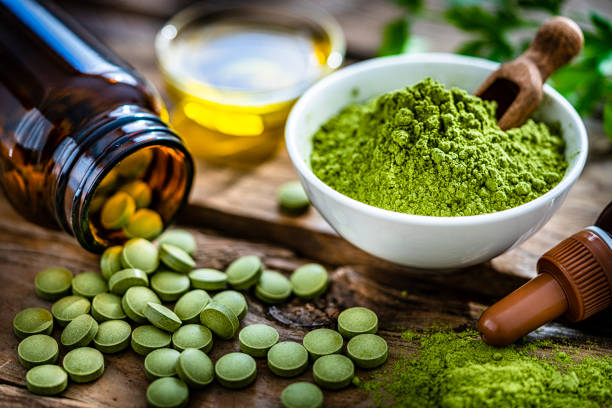
Source to Get Organic Moringa Leaf Powder Capsules
FAQs About Moringa Powder
- Is Moringa safe for everyone? While Moringa is safe for most people, pregnant and breastfeeding women should consult a healthcare provider before use.
- How quickly can I expect to see health benefits from Moringa? Benefits can vary, but some people report feeling more energetic and healthier within a few weeks.
- Can Moringa help with weight loss? Moringa can support weight loss as part of a healthy diet and exercise program, thanks to its nutrient density and low calorie count.
- Does Moringa interact with medications? Moringa may interact with certain medications, so it’s important to consult with a healthcare professional if you’re taking any medication.
- How should I store Moringa powder? Keep it in a cool, dry place away from direct sunlight to preserve its nutritional value.
Conclusion
Moringa powder is a versatile and powerful supplement that offers a wide range of health benefits. From its rich nutritional profile to its environmental sustainability, Moringa truly is a leaf of life that can contribute significantly to improving nutrition and health. Incorporating Moringa powder into your diet could be a simple yet effective way to enhance your overall well-being.

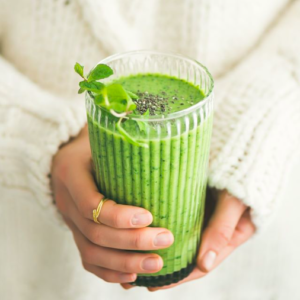



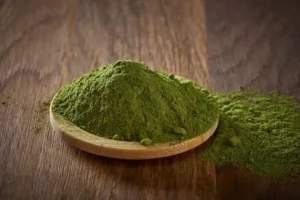
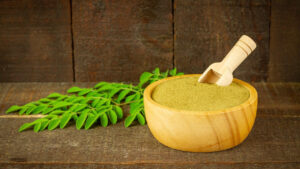
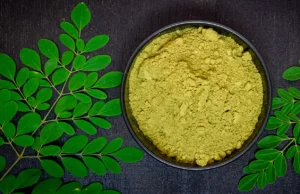

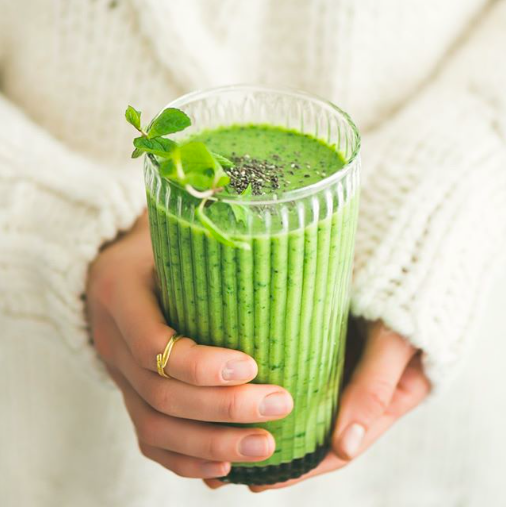
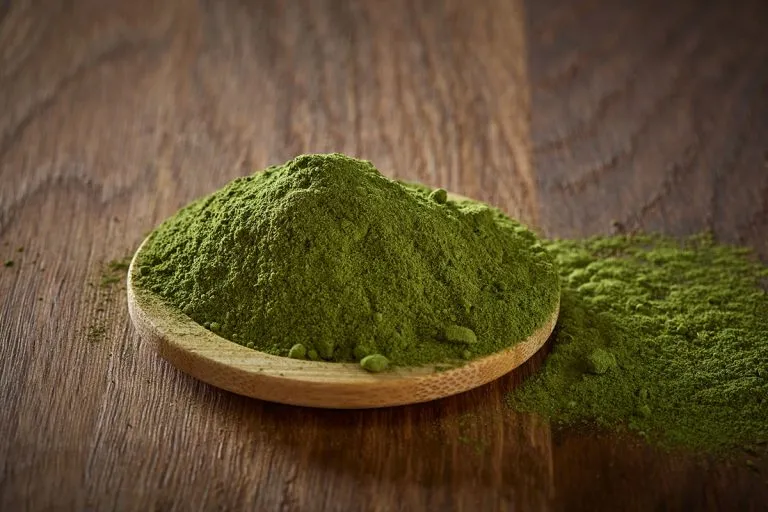
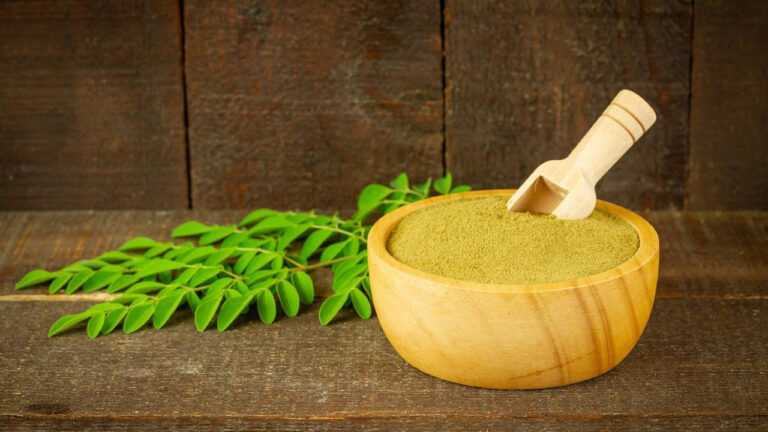
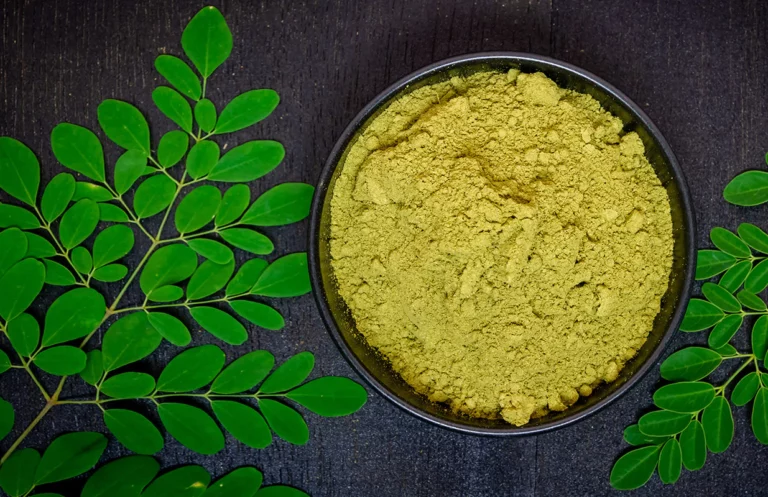




+ There are no comments
Add yours